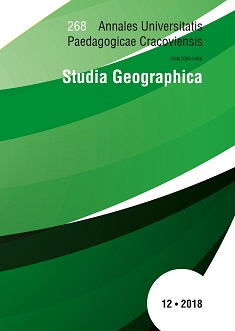Geographical Education in Northern Ireland: past, present and… future?
DOI:
https://doi.org/10.24917/20845456.12.9Słowa kluczowe:
Geography, geographical education, initial teacher education, Northern IrelandAbstrakt
In Northern Ireland geography is taught in primary and post-primary education, where it is a compulsory subject to age 14. Thereafter, students decide if they wish to continue to GCSE (age 16) and to A-level by age 18. Mirroring geography in the school sector, geographical education also features within initial teacher education programmes in Northern Ireland. However, the configuration of the subject, its place within the local educational landscape and its popularity with students has changed in significant and profound ways. This paper reflects on recent trends and considers the implications for geography and geographical education in the years ahead.Bibliografia
Adey, K., & Biddulph, M. (2001). The influence of pupil perception on subject choice at 14+ in geography and history. Educational Studies, 27(4), 439–450.
Brooks, C. (2006). Geographical Knowledge and Teaching geography. International Research in geographical & Environmental Education, 15(4), 353–369.
Butt, G., & Lambert , D. (2014). International Perspectives on the future of geography education: an analysis of national curricula and standards. International Research in geographical and Environmental Education, 23(1), 1–12.
Cambridge Assessment Data Bytes. (2018). (Cambridge University, UK) Retrieved from http://www.cambridgeassessment.org.uk/our-research/data-bytes/the-most-popular-non-compulsory-gcse-subjects-in-the-period-2005-2014/
Catling, S., & Martin, F. (2011). Contesting powerful knowledge: the primary geography curriculum as an articulation between academic and children’s (ethno-) geographies. The Curriculum Journal, 22(3), 317–335.
CCEA. (n.d.). Geography Microsite. Retrieved 2018, from http://www.rewardinglearning.org.uk/microsites/geography/
CEA. (2018). Retrieved from http://ccea.org.uk/sites/default/files/docs/news/2018/Feb/Annual_Quals_Insight_2017.pdf
Dolan, A. W. (2016). Learning to teach primary geography in the context of school placements: lessons from an all_ireland study. European Journal of Teacher Education, 39(1), 20–35.
Dolan, A., Waldron, F., Pike, S., & Greenwood, R. (2014). Student teachers’ reflections on prior expereinces of learning. International Research in geographical and Environmental Education, 23, 314–330.
Education and Training Inspectorate of Northern Ireland. (2015). An evaluation of the implementation of the World Around Us in primary schools. Belfast.
Fogele, J. (2014). From content to concept teaching glocal issues with geographical principles. European Journal of Geography, 7(1), 6–16.
GA. (2018). www.geography.org. Retrieved from https://www.geography.org.uk/write/MediaUploads/Advocacy%20Files/GA_Geography_ITE_training_and_supply_2018.pdf).
Greenwood, R. (2007). Geography Teaching in Northern Ireland Primary Schools: A survey of Content and Cross-curricularity. International Research in Geographical & Environmental Education, 16(4), 380–398.
Greenwood, R., Richardson, N., & Gracie, A. (2017). Primary Humanities – a perspective from Northern Ireland. Education 3–13, 45(3), 309–319.
Guardian. (2015). Retrieved from https://www.theguardian.com/commentisfree/2015/aug/13/the-guardian-view-on-geography-its-the-must-have-a-level
Gudmundsdottir, S. (1990). Values in pedagogical content knowledge. Journal of Teacher Education, 41(3), 44–52.
Harte, W., & Reitano, P. (2015). Pre-service geography teachers’ confidence in geographical subject matter knowledge and teaching skills. International Research in geographical and Environmental Education, 24 (3).
Hourihane, J., & Keane, M. (2004). Retrieved July 2018, from http://belgeo.revues.org/10071
Irvine, S. (2018, August). Retrieved from Irish History Live: https://www.qub.ac.uk/sites/irishhistorylive/IrishHistoryResources/Shortarticlesandencyclopaediaentries/Encyclopaedia/LengthyEntries/Education/
Kent, W.A., Rawling, E.M. & Robinson A. (2004). Geographical education: Expanding horizons in a shrinking world. Glasgow: SAGT with CGE.
Korthagen, F. (2004). In search of the essence of a good teacher: Towards a more holistic approach in teacher education. Teaching and Teacher Education, 20.
Marden, W. (1997). On taking the geography out of geographical education. Geography, 82 (3).
Martin, F. (2008). Knowledge bases for effective teaching: Beginning teachers’ development as teachers of primary geography. International Research in geographical and Environmental Education, 17(1), 13–19.
Meredith, R. (2017). A-level results in Northern Ireland show big rise in top grades. Retrieved from https://www.bbc.co.uk/news/u-northernireland-40949731
Montgomery, A., & Smith, A. (2006). Teacher Education in Northern Ireland; policy variations since devolution. Scottish Educational Review, 37, 46–58.
Morgan. (2002). Teaching geography for a Better World? The postmodern challenge and Geography Education. International Research in Geographical and Environmental Education, 11(1), 15–29.
OFSTED. (2015). Key Stage 3: the wasted years?
Pike, S. (2011). “If you went out it would stick”: Irish children’s learning in their local environments. International Research in geographical and Environmental Education, 20(2), 139–159.
Rawling, E. (2004). Introduction: School geography around the world. In W.A. Kent, E.M. Rawling, & A. Robinson (Eds.), Geographical education: Expanding horizons in a shrinking world (pp. 167–169). Glasgow: SAGT with CGE.
Russell Group. (2018). Retrieved July 2018, from https://russellgroup.ac.uk/for-students/school-and-college-in-the-uk/subject-choices-at-school-and-college/
Shulman, L. (1986). Those Who Understand: Knowledge Growth in Teaching. Educational Researcher, 15(1), 4–14.
Swyngedouw, E. (2004). Globalisation or’glocalisation’? Networks, territories and rescaling. Cambridge Review of International Affairs, 17(1), 25–48.
Thrift, N. (2002). The Future of Geography; when the whole is less than the sum of its parts. Geoforum, 33, 291–298.
Weeden, P., & Lambert, D. (2010). Unequal access: why some young people don’t do geography. Teaching Geography, 35(2), 74–75.
Wheeler, A. Y. (2011). Study skills enhancement through geographyand environmental fieldwork. Planet, 24(1), 14–20.
Pobrania
Opublikowane
Numer
Dział
Licencja
Złożenie artykułu do druku oznacza wyrażenie zgody na bezpłatne (tj. bez honorariów autorskich) przeniesienie autorskich praw majątkowych na Wydawcę i zezwolenie na wydanie pracy w postaci drukowanej w dowolnej liczbie egzemplarzy oraz zamieszczenie jej w postaci otwartego dostępu na stronie internetowej czasopisma, w bibliotekach cyfrowych oraz innych cyfrowych platformach wydawniczych, z którymi Wydawca zawarł lub zawrze stosowne porozumienie o udostępnianiu. W przypadku artykułów wieloautorskich przyjmuje się, że autor zgłaszający pracę („correspondingauthor”) ma pełnomocnictwo do reprezentowania pozostałych współautorów w tym zakresie. Autorzy są proszeni o podpisanie stosownego oświadczenia w tej sprawie.

